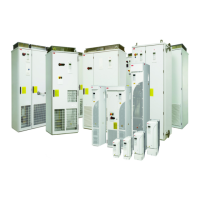Actual signals and parameters
86
23.02 INTEGRATION TIME Defines an integration time for the speed controller. The integration
time defines the rate at which the controller output changes when the
error value is constant. The shorter the integration time, the faster the
continuous error value is corrected. Too short an integration time
makes the control unstable.
The figure below shows the speed controller output after an error step
when the error remains constant.
0.01…999.97 s Integration time. 1000 = 1 s
23.03 DERIVATION TIME Defines the derivation time for the speed controller. Derivative action
boosts the controller output if the error value changes. The longer the
derivation time, the more the speed controller output is boosted during
the change. If the derivation time is set to zero, the controller works as
a PI controller, otherwise as a PID controller.
The derivation makes the control more responsive for disturbances.
Note: Changing this parameter is recommended only if a pulse
encoder is used.
The figure below shows the speed controller output after an error step
when the error remains constant.
0.0…9999.8 ms Derivation time value. 1 = 1 ms
No. Name/Value Description FbEq
T
I
Controller Output
t
%
Gain = K
p
= 1
T
I
= Integration time > 0
T
D
= Derivation time = 0
K
p
· e
e = Error value
K
p
· e
T
I
K
p
· e
Error Value
Controller Output
t
%
Gain = K
p
= 1
T
I
= Integration time > 0
T
D
= Derivation time > 0
T
s
= Sample time period = 2 ms
Δe = Error value change between
two samples
e = Error value
K
p
· T
D
·
Δe
T
s
K
p
· e

